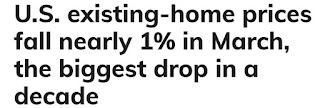FANGs eight companies — Apple Inc., Amazon.com Inc., Alphabet Inc., Meta, Microsoft Corp., Netflix Inc., Nvidia Corp. and Tesla Inc. — have accounted for all the S&P 500’s growth this year. The other 492 stocks are down slightly Credit Suisse Group AG, for all its difficulties in recent years, remains a far more important institution for the rest of the world than Lehman Brothers was back in 2008. And yet its forced fire sale to rival UBS Group AG seems to have satisfied everyone that the problem is over. UBS’s share price has wavered widely in the last month, but its direction is plainly upward Across the system as a whole, deposits are declining, although the total cash piles being kept on deposit still appear to be larger than they would have been had they merely continued to grow in line with the pre-pandemic trend Arguably the most worrying element of the First Republic imbroglio is that a big coordinated effort was made a month ago to avert such a scenario, and it doesn’t s









